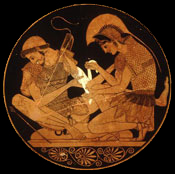

Throughout The Iliad, the gods appear – they interfere and intervene, but eventually, they must, like man, bow to fate. Because man is ultimately victim to fate, yet also accomplice to it, the gods, as reflections of man, are therefore the tools of fate as well. This works in two ways: first, as an explanation of the unknown, and second, as a literary device.
The first prominent example of the gods as the tools of fate appears in Book 1 when Athena stops Achilles from killing Agamemnon (1.193 – 222). It was much wiser not to kill Agamemnon, and here, Athena serves to cool Achilles' heated impulse and preserve the destiny of Agamemnon, the very destiny that Achilles hints at (1.205). Athena's appearance in this passage could also be viewed as a physical reflection of Achilles' thoughts. As the goddess of wisdom, she is the obvious choice to explain the wisdom of Achilles' sudden inaction. In either view, Athena's presence and influence preserve these characters ultimate fates.
In Book 3, this time Aphrodite is the acting goddess. She snatches Paris from death before his time (3.373 ff.). His disappearance form the battlefield is explained only by Aphrodite wrapping him in mist and carrying him away. This is somewhat indicative of his slippery character but serves a bigger purpose by eventually ensuring Achilles' death shortly after Hektor's, as was fates. Also, had Paris dies, the war would have ended and Achilles never would have been able to regain his time by reentering the battle. Paris' escape via the hand of Aphrodite explains his unusual disappearance but could also serve as a literary metaphor for the place of love on the battlefield in this society.
A good example of the gods also being at the mercy of fate is in Book 16 when Sarpedon, son of Zeus, is about to die (16.431 ff.). Zeus wants to pull his son out of the fighting to save his life. Hera tells him that he will incur resentment with the other gods. She also says that if he cares so much for Sarpedon, he should let his destiny be fulfilled. It was Sarpedon's time to die and Zeus is prevented from interfering, even though he very much wants to save him. Zeus, for all his power as a god, must abide by fate. In this instance, Zeus' inability to save his son is a comment on the situation. Not even divine intervention could save Sarpedon from death at the hands of Patroklos.
In Book 22, the fates of both Achilles and Hektor are set out for the audience (22.208 ff.). The scales are balanced with "two fateful portions of death." All the gods saw that Hektor's time to die was near and even Apollo "forsook him." There was nothing anyone – man or god – could do in the face of destiny. The audience already knows that Achilles will die, and this passage serves to tie these stories together.
The Iliad demonstrates that everyone's ultimate fate is inescapable, no matter if you are man or god. In literature, the gods serve a purpose beyond historical account. They supply a convenient explanation of things or actions that otherwise defy explanation. They also serve a literary function by creating a tangible aspect of emotion, thought, and reason.